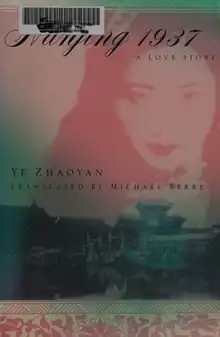Nanjing 1937: A Love Story
Nanjing 1937: A Love Story (Chinese: 一九三七年的爱情; Yijiusanqi nian de aiqing)[2]: 115 is a 1996 romantic novel written by Ye Zhaoyan.[1] Originally published in Chinese by Jiangsu Art and Literature Press, it was translated into English by Matthew Berry and published by Columbia University Press in December 2002.[1]
 | |
| Author | Ye Zhaoyan |
|---|---|
| Original title | 一九三七年的爱情 |
| Translator | Matthew Berry |
| Country | China |
| Language | Chinese |
| Genre | Romance |
| Set in | Nanjing, 1937 |
| Publisher | Jiangsu Art and Literature Press, Columbia University Press |
Publication date | 1996 |
Published in English | December 2002 |
| Media type | |
| Pages | 234 (English)[1] |
| ISBN | 9780231127547 |
Background and publication
Research
While preparing to write the novel, Ye consulted various primary and secondary historical sources.[3]: 186 Throughout the story, Ye details every political and military development from 1 January 1937 until the Nanjing Massacre on 13 December of the same year, including "petty tabloid gossip" and minor cultural events, to create a "historical chronology".[2]: 118
Publication
Nanjing 1937 was originally published in China in 1996 by Jiangsu Art and Literature Press.[3]: 252 It was later translated into English by Matthew Berry and published by Columbia University Press in December 2002.[1]
Summary
The book tells the story of Ding Wenyu, a narcissistic language professor, and his affair with Ren Yuyuan, a young married Sino-Japanese woman.[1] As the relationship between the two develops, it echoes the surrounding acts of war,[1] but remains focused on the "domestic and trivial".[4] After the death of Yuyuan's husband, the book ends with the two main characters fleeing Nanjing on the eve of the Massacre.[4]
Ding Wenyu is a Chinese professor who was educated in the West.[4] Described by The Independent as a "spineless antihero", he is guided spiritually by the characters created by Lu Xun and Lao She.[4][2]: 120 Ding has been suggested as a metaphor for the Chinese national character,[4] and considers his actions in a military-like way.[3]: 186
Critical analysis
Despite the events of the book occurring during the Battle of Nanjing, Ye tackles the conflict in a way that differs from the typical nationalist view present in China.[3]: 186 Instead of focusing on the "rape" of China by Japanese forces, he explores the relationship between a Chinese man and Sino-Japanese woman: love is the focus of the novel, not war.[3]: 187 While there is violence present in the novel, the majority of it is domestic and focuses on the actions of Chinese people against each other, from abuse to murder.[3]: 186 The only description of war violence comes in the final scenes of the novel, when Ding and Yuyuan flee from Nanjing: he is killed in the Japanese attack.[3]: 186
Anticipating the possibility of censorship due to his unorthodox approach, Ye wrote in the foreword: "I write this novel without any regard for what the consequences might be; heaven only knows if anyone will see it."[3]: 187
Reception
When Nanjing 1937 was published in China, it became a bestseller.[4]
References
- "CUP - Nanjing 1937: A Love Story". cup.columbia.edu. Retrieved 15 November 2019.
- Rojas, Carlos; Chow, Eileen (2008). Rethinking Chinese Popular Culture: Cannibalizations of the Canon. Routledge. ISBN 9781134032242. Retrieved 15 November 2019.
- Callahan, William A. (2012). China: The Pessoptimist Nation. Oxford University Press. ISBN 9780199604395. Retrieved 15 November 2019.
- "Nanjing 1937: a love story by Ye Zhaoyan, tr. Michael Berry". The Independent. 10 May 2003. Archived from the original on 2022-06-18. Retrieved 15 November 2019.